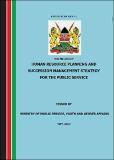Nairobi City County Policy on Private Sector Involvement in Solid Waste Management 2001
View/
Publication Date
2001Author
Type
Policy Paperviews
downloads
Metadata
Show full item recordBy
Nairobi City Council
Abstract/
Rapid urbanization and the resulting industrial and service sector growth are key features of economic and demographic development in developing countries. However, one of the significant environmental challenges associated with urbanization is the increasing amount of solid waste generated. In Nairobi, with a population of approximately 2.2 million people, the city produces around 1600 tons of solid waste per day, which equates to 0.72 kg per capita generation daily. This volume has exceeded the capacity of the city council to collect and dispose of waste efficiently and safely. To address this issue, the city council has decided to collaborate with the private sector and Community Based Groups to manage solid waste in the city. This approach, widely practiced globally, fosters healthy competition, efficiency, and contributes to poverty alleviation programs. The policy aims to establish a systematic framework for private waste operators, formalizing and regulating waste management services while ensuring compliance with environmental laws and regulations. As Nairobi is the capital city and a prominent commercial center in Eastern and Central Africa, the Mayor appeals to private waste operators and the public to support and adhere to the policy. The collective effort is crucial for maintaining a clean, healthy, and aesthetically pleasing environment that benefits everyone.
Subject/
Urbanization; Waste Management; Environmental Management; Waste Operators; Demoghraphic Development
Publisher
Nairobi City CouncilSeries
Policy Paper;2001Collections
- Policy Papers [4]
Related items
Showing items related by title, author, creator and subject.
-
Nyamira County Debt Management Strategy Paper 2019
County Government of Nyamira (County Government of Nyamira, 2018)The 2019 Nyamira County Government Debt Management Strategy is the fifth to be generated by the County Treasury. This is in line with section 123 of the Public Finance Management Act 2012 which stipulates that on or ... -
Human Resource Planning and Succession Management Strategy for the Public Service 2017
Ministry of Public Service, Youth and Gender Affairs (Ministry of Public Service, Youth and Gender Affairs, 2017)The main objective of this strategy document is to provide strategies to address the existing and future succession management challenges. Specific objectives are to:- (i) Institutionalize human resource planning aligned ... -
Kitui County First County Integrated Development Plan 2013- 2017
County Government of Kitui (County Government of Kitui, 2013)This CIDP has eight chapters. Chapter one provides background information that informs the other chapters in terms of challenges, constraints, opportunities and threats that need to be taken into account while addressing ...




